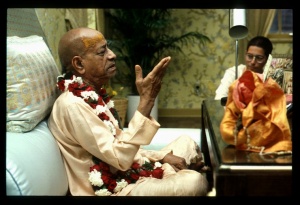CC Madhya 25.37: Difference between revisions
No edit summary |
(Vanibot #0054 edit - transform synonyms into clickable links, which search similar occurrences) |
||
| Line 19: | Line 19: | ||
<div class="synonyms"> | <div class="synonyms"> | ||
''dṛṣṭam'' | ''[//vanipedia.org/wiki/Special:VaniSearch?s=dṛṣṭam&tab=syno_o&ds=1 dṛṣṭam]'' — experienced by direct perception; ''[//vanipedia.org/wiki/Special:VaniSearch?s=śrutam&tab=syno_o&ds=1 śrutam]'' — experienced by hearing; ''[//vanipedia.org/wiki/Special:VaniSearch?s=bhūta&tab=syno_o&ds=1 bhūta]'' — past; ''[//vanipedia.org/wiki/Special:VaniSearch?s=bhavat&tab=syno_o&ds=1 bhavat]'' — present; ''[//vanipedia.org/wiki/Special:VaniSearch?s=bhaviṣyat&tab=syno_o&ds=1 bhaviṣyat]'' — which will be in the future; ''[//vanipedia.org/wiki/Special:VaniSearch?s=sthāsnuḥ&tab=syno_o&ds=1 sthāsnuḥ]'' — immovable; ''[//vanipedia.org/wiki/Special:VaniSearch?s=cariṣṇuḥ&tab=syno_o&ds=1 cariṣṇuḥ]'' — movable; ''[//vanipedia.org/wiki/Special:VaniSearch?s=mahat&tab=syno_o&ds=1 mahat]'' — the greatest; ''[//vanipedia.org/wiki/Special:VaniSearch?s=alpakam&tab=syno_o&ds=1 alpakam]'' — the smallest; ''[//vanipedia.org/wiki/Special:VaniSearch?s=vā&tab=syno_o&ds=1 vā]'' — or; ''[//vanipedia.org/wiki/Special:VaniSearch?s=vinā&tab=syno_o&ds=1 vinā]'' — except; ''[//vanipedia.org/wiki/Special:VaniSearch?s=acyutāt&tab=syno_o&ds=1 acyutāt]'' — the infallible Personality of Godhead; ''[//vanipedia.org/wiki/Special:VaniSearch?s=vastu&tab=syno_o&ds=1 vastu]-[//vanipedia.org/wiki/Special:VaniSearch?s=tarām&tab=syno_o&ds=1 tarām]'' — anything else; ''[//vanipedia.org/wiki/Special:VaniSearch?s=na&tab=syno_o&ds=1 na] [//vanipedia.org/wiki/Special:VaniSearch?s=vācyam&tab=syno_o&ds=1 vācyam]'' — not to be spoken; ''[//vanipedia.org/wiki/Special:VaniSearch?s=saḥ&tab=syno_o&ds=1 saḥ]'' — that Supreme Personality of Godhead; ''[//vanipedia.org/wiki/Special:VaniSearch?s=eva&tab=syno_o&ds=1 eva]'' — certainly; ''[//vanipedia.org/wiki/Special:VaniSearch?s=sarvam&tab=syno_o&ds=1 sarvam]'' — everything; ''[//vanipedia.org/wiki/Special:VaniSearch?s=paramātma&tab=syno_o&ds=1 paramātma]-[//vanipedia.org/wiki/Special:VaniSearch?s=bhūtaḥ&tab=syno_o&ds=1 bhūtaḥ]'' — the origin of all causes. | ||
</div> | </div> | ||
Latest revision as of 23:18, 19 February 2024

A.C. Bhaktivedanta Swami Prabhupada
TEXT 37
- dṛṣṭaṁ śrutaṁ bhūta-bhavad-bhaviṣyat
- sthāsnuś cariṣṇur mahad alpakaṁ vā
- vinācyutād vastu-tarāṁ na vācyaṁ
- sa eva sarvaṁ paramātma-bhūtaḥ
SYNONYMS
dṛṣṭam — experienced by direct perception; śrutam — experienced by hearing; bhūta — past; bhavat — present; bhaviṣyat — which will be in the future; sthāsnuḥ — immovable; cariṣṇuḥ — movable; mahat — the greatest; alpakam — the smallest; vā — or; vinā — except; acyutāt — the infallible Personality of Godhead; vastu-tarām — anything else; na vācyam — not to be spoken; saḥ — that Supreme Personality of Godhead; eva — certainly; sarvam — everything; paramātma-bhūtaḥ — the origin of all causes.
TRANSLATION
"'Lord Śrī Kṛṣṇa, the Supreme Personality of Godhead, is the cause of all causes. He is past, present and future, and He is the movable and immovable. He is the greatest and the smallest, and He is visible and directly experienced. He is celebrated in the Vedic literature. Everything is Kṛṣṇa, and without Him there is no existence. He is the root of all understanding, and He is that which is understood by all words.'
PURPORT
This verse from Śrīmad-Bhāgavatam (SB 10.46.43) was spoken by Uddhava when he came to pacify all the inhabitants of Vṛndāvana during Kṛṣṇa’s absence.